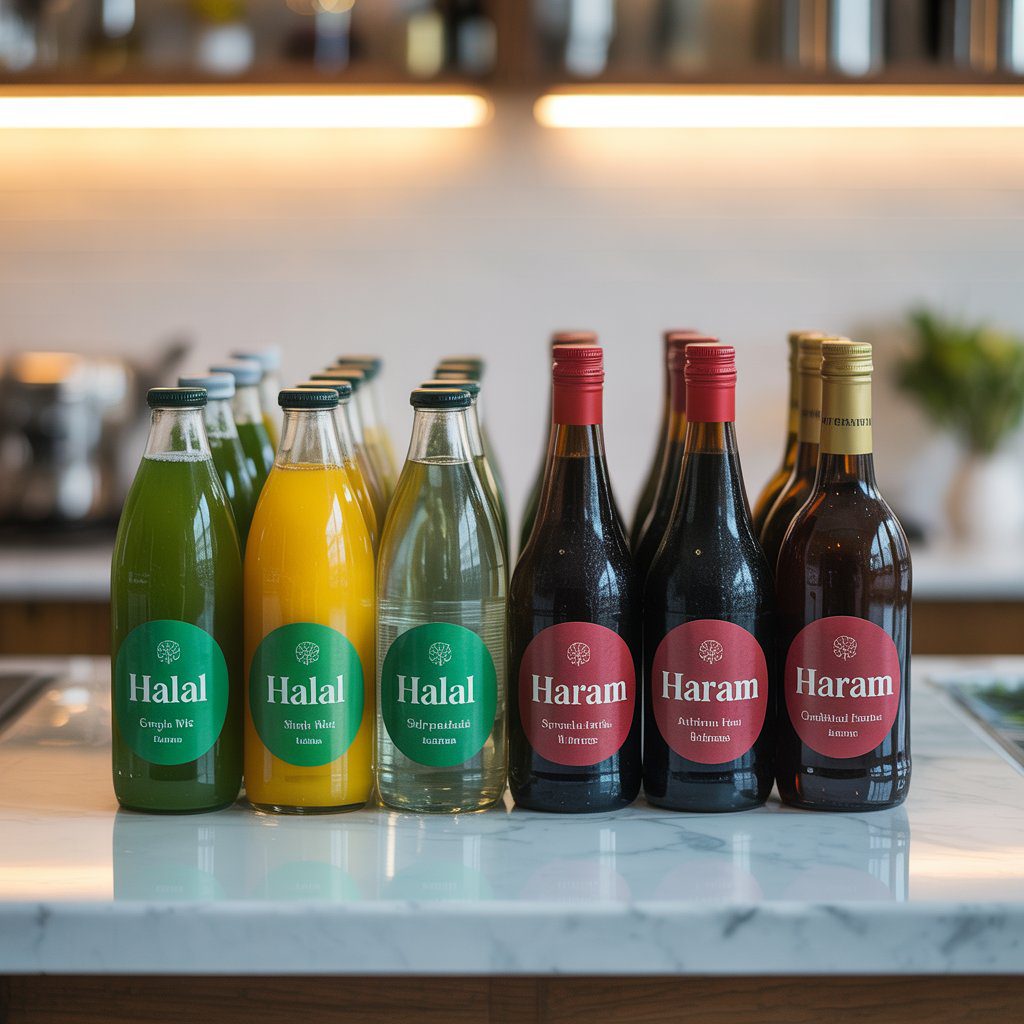🥤 Halal and Haram Drinks in Islam: Complete Guide for Western Muslims
What are Halal Haram Drinkables in Islam?

Table of Contents
1. What Makes a Drink Halal or Haram?
2. Are Energy Drinks Like Monster and Red Bull Halal?
3. Non-Alcoholic Beers (Heineken 0.0, Bud Zero) – Halal or Not?
4. What About Mocktails, Kombucha, and Flavored Beverages?
5. Understanding Labels: Hidden Alcohol, Gelatin, and More
6. The Fiqh Behind Alcohol Traces: 0.0%, 0.3%, 0.5% – What’s Allowed?
7. The Islamic View on Health-Damaging Drinks
8. Real-Life Halal Drink Alternatives (USA, UK, Canada)
9. Quran & Hadith Rulings on Drinkables
10. Final Checklist: How to Ensure What You Drink Is Halal
11. FAQs
12. Conclusion
 1. What Makes a Drink Halal or Haram?
1. What Makes a Drink Halal or Haram?
In Islam, a drink is considered halal (permissible) if:
It does not intoxicate the mind or impair judgment.
It contains no alcohol, narcotics, or harmful substances.
It’s pure (ṭayyib), beneficial, and doesn’t harm the body or soul.
Conversely, any drink is haram (forbidden) if it:
Intoxicates in any amount (even a drop),
Contains ethanol, beer, wine, or alcohol, whether natural or synthetic,
Has impure ingredients like animal blood, non-zabiha gelatin, or unlawful extracts,
Is proven medically or socially harmful.
Prophet Muhammad ﷺ said:
“Whatever intoxicates in large quantities, a small quantity of it is also forbidden.”
— Sunan Ibn Majah, Hadith 3392
 2. Are Energy Drinks Like Monster and Red Bull Halal?
2. Are Energy Drinks Like Monster and Red Bull Halal?
 Most searched queries:
Most searched queries:
Is Monster Drink Halal?
Is Red Bull Halal?
Is Monster Energy Drink Halal?
 Short Answer:
Short Answer:
Yes, most standard flavors of Monster, Red Bull, and other energy drinks are halal, if:
They do not contain alcohol.
The taurine is synthetic (not from animals).
No non-halal gelatin or enzymes are present.

 Caution:
Caution:
Avoid flavors with suspicious additives or limited edition versions where ingredient sources aren’t declared. Always read labels or contact the brand.
 3. Non-Alcoholic Beers (Heineken 0.0, Bud Zero) – Halal or Not?
3. Non-Alcoholic Beers (Heineken 0.0, Bud Zero) – Halal or Not?
This is the most confusing topic for many Muslims in the West.
 Are “non-alcoholic beers” actually alcohol-free?
Are “non-alcoholic beers” actually alcohol-free?
Many brands (like Heineken 0.0, Budweiser Zero, Guinness 0.0) contain up to 0.05% alcohol.
This trace can accumulate, especially for regular drinkers.
These drinks mimic alcoholic beverages in branding, taste, and packaging.
 Most Islamic scholars say:
Most Islamic scholars say:
Even trace alcohol in these beverages is haram, especially due to intent, imitation, and possible intoxication over time.
Quran 5:90
“O you who believe! Intoxicants… are an abomination of Satan’s handiwork. So avoid them…”
Fatwa by Dar al-Ifta al-Misriyyah:
“If a drink contains any level of alcohol and is taken as a substitute for beer or intoxicants, it becomes prohibited, even if non-intoxicating.”
 Safer Alternatives:
Safer Alternatives:
Halal-certified malt drinks (Barbican, Malta, etc.)
Fruit sparkling sodas
Homemade mocktails with natural ingredients
 4. What About Mocktails, Kombucha, and Flavored Drinks?
4. What About Mocktails, Kombucha, and Flavored Drinks?
 Mocktails:
Mocktails:
Halal if alcohol was never used in preparation.
Watch for non-halal vanilla extracts, rum flavorings, or alcohol-cooked syrups.
 Kombucha:
Kombucha:
Naturally fermented, contains 0.5% or more alcohol. Most scholars forbid it unless fully alcohol-free.
 Flavored water or sodas:
Flavored water or sodas:
Usually halal if:
No ethanol-based flavors
No haram gelatin (cloudy beverages)
 5. Understanding Labels: Alcohol, Gelatin, and Enzymes
5. Understanding Labels: Alcohol, Gelatin, and Enzymes
When checking a drink label:
| Ingredient | Ruling | Note |
|---|---|---|
| Ethanol / Alcohol |  Haram Haram | Even <0.5% is impermissible. |
| Taurine (synthetic) |  Halal Halal | Common in energy drinks. |
| Natural Flavors |  Doubtful Doubtful | Can be alcohol-extracted. |
| Cochineal (E120) |  Haram Haram | From crushed insects. |
| Gelatin |  Depends Depends | Only halal if sourced from zabiha animals or halal-certified. |
 6. The Fiqh Behind Alcohol Traces (0.0%, 0.3%, 0.5%)
6. The Fiqh Behind Alcohol Traces (0.0%, 0.3%, 0.5%)
 Key Opinions:
Key Opinions:
Anything intoxicating in large quantities is haram in small quantities — (Ibn Majah 3392)
If alcohol is added intentionally, it’s haram regardless of amount.
If alcohol forms naturally (like in juice fermentation) and remains non-intoxicating, some scholars permit.
However, due to doubt, scholars advise avoiding even trace alcohols in modern drinks.
 7. Are Harmful or Addictive Drinks Also Haram?
7. Are Harmful or Addictive Drinks Also Haram?
Yes. If a drink causes harm, addiction, or health damage, it may be makruh or haram.
Quran 2:195
“And do not throw yourselves with your own hands into destruction.”
This includes:
High-caffeine drinks causing heart issues
Drinks causing addiction or dependence
Drinks with unproven chemical stimulants
 8. Halal Drink Options (USA, UK, Canada)
8. Halal Drink Options (USA, UK, Canada)
Here are safe, halal-friendly beverages easily available in the West:
| Category | Examples |
|---|---|
| Halal Energy Drinks | Red Bull, Monster, Bang Energy (classic flavors) |
| Halal Malt Drinks | Barbican, Malta, Birell (check for certification) |
| Sparkling Juices | Welch’s, IZZE, Ocean Spray |
| Halal Soda | Coca-Cola, Sprite, Fanta |
| Organic Juices | Suja, Naked, Simply |
| Herbal Teas | Yogi, Traditional Medicinals, Celestial |
| Halal Mocktails | Homemade blends using halal syrups |
 9. Quran & Hadith Rulings on Drinkables
9. Quran & Hadith Rulings on Drinkables
| Source | Ruling | Reference |
|---|---|---|
| Quran 5:90 | All intoxicants are haram | “Avoid them so you may succeed.” |
| Ibn Majah 3392 | Small amounts of intoxicants = haram | “Whatever intoxicates in large…” |
| Sahih Muslim 2003 | Wine, even if not intoxicating, is haram | |
| Sahih Bukhari 4612 | Stay away from doubtful matters | “Halal is clear, haram is clear…” |
 10. Final Checklist: How to Ensure Your Drink Is Halal
10. Final Checklist: How to Ensure Your Drink Is Halal






❓ FAQ – Halal & Haram Drinks in Islam
Q1: Is Monster Energy Drink Halal?
Q2: Is Red Bull Halal in Islam?
Q3: Are non-alcoholic beers (like Heineken 0.0 or Bud Zero) halal?
Q4: What’s the Islamic ruling on “alcohol-free” labeled drinks?
Q5: Is kombucha halal?
Q6: Can Muslims drink Coca-Cola or Pepsi?
Q7: What about “natural flavors” listed on labels?
Q8: Are herbal teas halal?
Q9: Is it haram to drink something that has health risks, even if it’s halal?
Q10: What drinks are considered clearly halal for Muslims in the West?
 Conclusion: Knowledge Is the First Sip
Conclusion: Knowledge Is the First Sip
Understanding halal and haram drinkables isn’t about making life harder — it’s about honoring the trust Allah gave us over our bodies and hearts. By learning what to avoid and what to embrace, you protect your faith, lead your family rightly, and teach others with confidence.
Prophet ﷺ said:
“Halal is clear, haram is clear, and between them are doubtful matters… So avoid the doubtful…”
— Sahih Bukhari 52

Bookmark this page. Share it. Print it. Teach it.
This is not just a drink—it’s a step toward Jannah, sip by sip.
Quran & Hadith References
References from the Quran
- Forbidden Drinks – Alcohol and Intoxicants
“O you who have believed, indeed, intoxicants, gambling, [sacrificing on] stone alters to other than Allah, and divining arrows are but defilement from the work of Satan, so avoid it that you may be successful.”
(Surah Al-Ma’idah, 5:90)
- Water – A Blessing from Allah
“And We made from water every living thing. Then will they not believe?”
(Surah Al-Anbiya, 21:30)
- Water is one of the purest and most essential drinks in Islam and is always considered halal.
- Milk – Halal Drink
“And indeed, for you in the grazing livestock is a lesson. We give you to drink of what is in their bellies, between excretion and blood, pure milk, palatable to the drinkers.”
(Surah An-Nahl, 16:66)
- Milk from halal animals is considered pure and lawful to drink.
- General Rule About Halal Drinks
“This day [all] good foods have been made lawful, and the food of those who were given the Scripture is lawful for you, and your food is lawful for them.”
(Surah Al-Ma’idah, 5:5)
- This verse indicates that permissible (halal) food and drinks from the people of the Scripture (Jews and Christians) are lawful for Muslims, provided they meet Islamic guidelines.
References from Hadith
- Prohibition of Alcohol (Intoxicants)
“Every intoxicant is khamr (wine), and every khamr is haram.”
- Sahih Muslim, Hadith 2003
- This Hadith explains that alcohol and any intoxicating drink is haram.
- Right-Hand Etiquette for Eating and Drinking
“Eat with your right hand and drink with your right hand, for the Shaitan eats and drinks with his left hand.”
- Sahih Muslim, Hadith 2020
- While this hadith doesn’t address halal/haram directly, it emphasizes the etiquette of drinking with the right hand, which is an important part of Islamic eating and drinking practices.
- Milk as a Permissible Drink
“The milk of the camel and the sheep is a means of curing, and it is lawful (halal).”
- Sahih Muslim, Hadith 2360
- This Hadith discusses the permissibility and the benefits of drinking milk, confirming its status as halal.
- Prohibition of Intoxicants
“The Messenger of Allah (PBUH) said: Every intoxicant is haram, and every intoxicant is khamr (wine).”
- Sunan Abu Dawood, Hadith 3679
- Drinking from Halal Sources
“When you drink, drink with your right hand; when you eat, eat with your right hand, for the Shaytaan eats and drinks with his left hand.”
- Sahih Muslim, Hadith 2020
- This Hadith emphasizes drinking from lawful (halal) sources and eating in a proper manner.
Summary of References
- Haram Drinks (Prohibited)
- Alcohol and Intoxicants: Surah Al-Ma’idah, 5:90; Sahih Muslim, Hadith 2003
- Every intoxicating drink is considered haram, and this includes all forms of alcohol.
- Halal Drinks
- Water: Surah Al-Anbiya, 21:30
- Milk: Surah An-Nahl, 16:66; Sahih Muslim, Hadith 2360
- Juices, Tea, Coffee: These are halal as long as they don’t contain any forbidden ingredients.
- Etiquette for Drinking
- Right Hand for Drinking: Sahih Muslim, Hadith 2020
- The right-hand etiquette emphasizes drinking in a manner taught by the Prophet Muhammad (PBUH).
These references from the Quran and Hadith help clarify what is considered permissible (halal) and forbidden (haram) in terms of drinks in Islam. Muslims are encouraged to ensure that their drinks align with the teachings of Islam to maintain purity and follow the guidelines set by Allah and His Messenger (PBUH).

 2. Are Energy Drinks Like Monster and Red Bull Halal?
2. Are Energy Drinks Like Monster and Red Bull Halal? Most searched queries:
Most searched queries: 3. Non-Alcoholic Beers (Heineken 0.0, Bud Zero) – Halal or Not?
3. Non-Alcoholic Beers (Heineken 0.0, Bud Zero) – Halal or Not? Are “non-alcoholic beers” actually alcohol-free?
Are “non-alcoholic beers” actually alcohol-free? 4. What About Mocktails, Kombucha, and Flavored Drinks?
4. What About Mocktails, Kombucha, and Flavored Drinks? 6. The Fiqh Behind Alcohol Traces (0.0%, 0.3%, 0.5%)
6. The Fiqh Behind Alcohol Traces (0.0%, 0.3%, 0.5%) Key Opinions:
Key Opinions: 7. Are Harmful or Addictive Drinks Also Haram?
7. Are Harmful or Addictive Drinks Also Haram? 9. Quran & Hadith Rulings on Drinkables
9. Quran & Hadith Rulings on Drinkables Conclusion: Knowledge Is the First Sip
Conclusion: Knowledge Is the First Sip